On This Page
Best CPAP Supplies of 2026
Our Top Picks
-
Best Standard Tubing
Sunset Standard CPAP Tubing -
Best Filters for ResMed Machines
ResMed Replacement Filters -
Best CPAP Wipes
Purdoux CPAP Mask Wipes -
Best CPAP Machine Battery
Medistrom Pilot-24 Lite Battery and Backup Power Supply -
Best Travel Accessory
ResMed AirMini Travel Bag
Best Standard Tubing
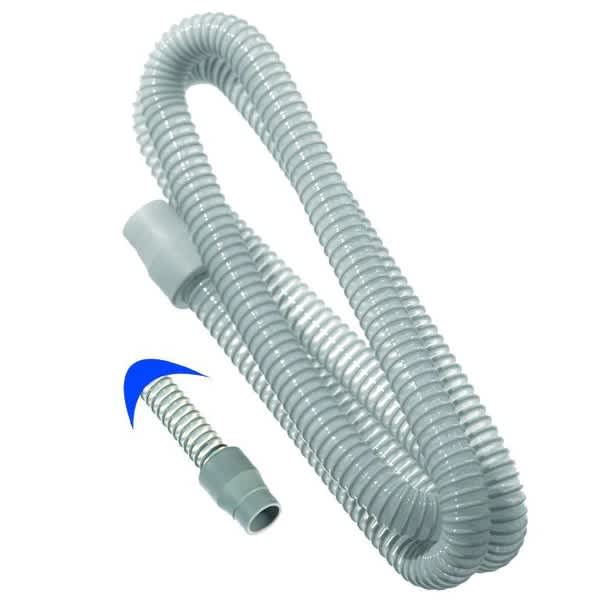
The Sunset Standard CPAP Tubing is a flexible hose with a modest price point. It comes in three lengths and is 19 millimeter in diameter, though it includes a 22-millimeter cuff.
Pros & Cons
Pros
- Available in 6-, 8-, or 10-foot models
- Standard 22-millimeter cuffs are compatible with most CPAP machines
- Easy to attach and detach
Cons
- Can be noisy and disruptive for sleep
- Not compatible with devices that have a cuff connector diameter outside the 19-22 mm range
Full Details
Best Filters for ResMed Machines
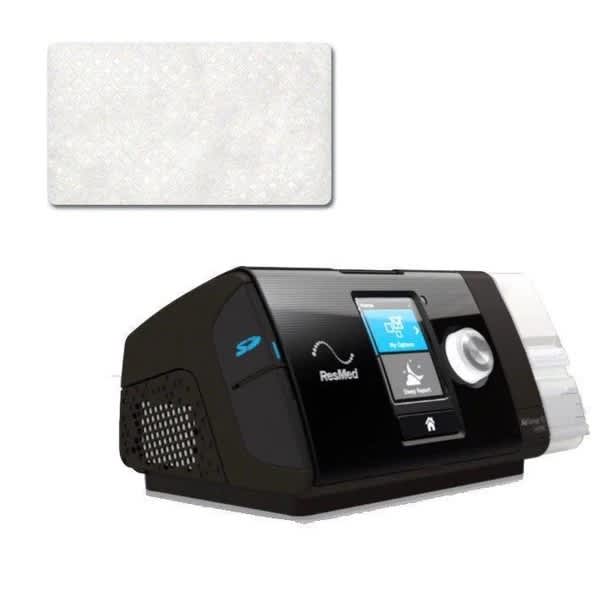
These replacement filters are compatible with a number of ResMed machines, including AirCurve and AirSense devices. These sturdy fibers filter out dust, pollen, smoke, and other allergens from the air.
Pros & Cons
Pros
- Three disposable filters
- Ultrafine weave filters out small and large particles
- Compatible with ResMed AirCurve and AirSense machines
Cons
- Users should buy a new pack each month
- Incompatible with non-ResMed machines
Full Details
Best CPAP Wipes
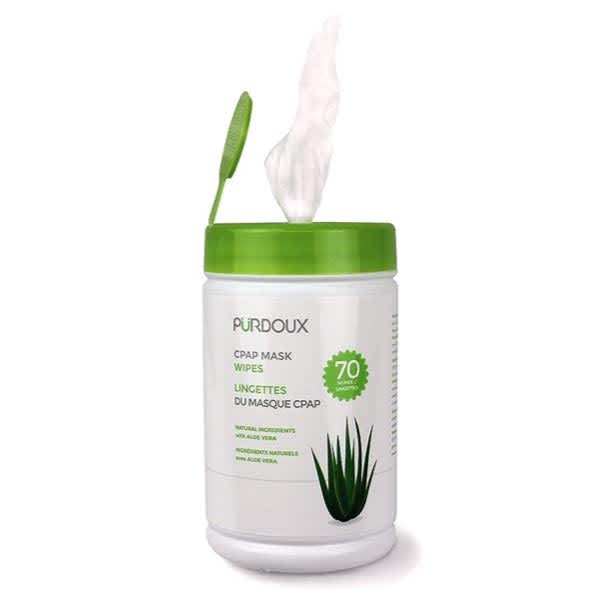
Regularly wiping down your mask and the outside of your machine keeps therapy running smoothly and hygienically. Purdoux CPAP Mask Wipes are made from naturally absorbent cotton and don't contain alcohol or solvents.
Pros & Cons
Pros
- Each wipe composed of highly absorbent cotton
- Scented with natural citrus
- Subscribers save 15% on their purchase
Cons
- Owners need to restock their supply every 3 months
- More expensive than conventional wet wipes
Full Details
Best CPAP Machine Battery
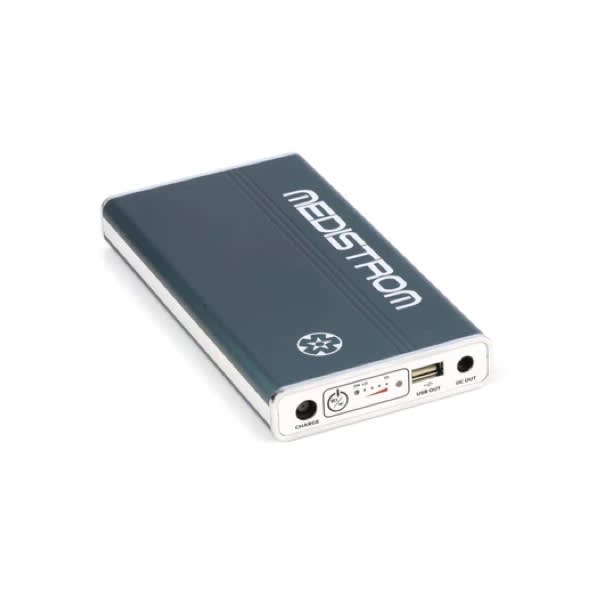
The Medistrom Pilot-24 Lite is a compact battery that powers a range of CPAP machines. At just 1.3 pounds, the battery won’t weigh you down during road trips or while camping. It’s also approved by the Federal Aviation Administration (FAA) for in-flight use.
Pros & Cons
Pros
- Runs for 10 or more hours on one charge
- Compatible with many 24-volt CPAP machines, including popular ResMed models
- FAA-compliant for in-flight use
Cons
- Requires daily recharging
- High price may be a deterrent for some shoppers
Full Details
Best Travel Accessory
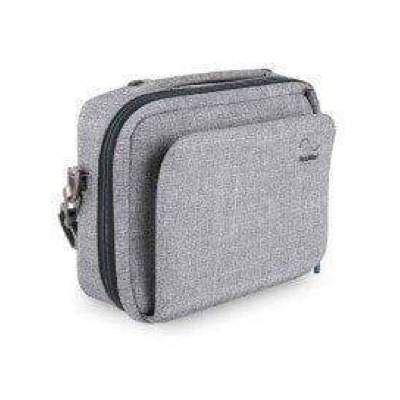
ResMed’s AirMini Travel Bag is included with the AirMini Travel CPAP Machine and is also sold separately. While it’s designed for use with the AirMini, it can also accommodate many other travel CPAP machines.
Pros & Cons
Pros
- Three interior compartments and a mesh pocket
- Zippered design for security
- Adjustable shoulder strap
Cons
- Bag cannot be machine-washed
- May not provide enough room for equipment for non-ResMed products
Full Details
How We Make Our Picks
We take care to make sure any product we recommend is worth your consideration. We use a blend of real-world reviews and industry expertise to determine which accessories to include. Our sleep experts have decades of clinical and research experience, giving us a thorough understanding of any products we choose to highlight.
We also know that user experiences are critical, so we analyze verified customer reviews to see what real-world users think of each product. Our researchers also consider emerging peer-reviewed data and product recalls when choosing the best CPAP supplies.
How to Find the Best CPAP Supplies for You
When shopping for the best CPAP supplies, it’s important to consider material quality, durability, and pricing. Many CPAP accessories are only compatible with specific machines, so it’s also crucial that you check compatibility with your device before making a purchase.
Follow Your Doctor’s Recommendations
Each person with sleep apnea is different, so your doctor can recommend a CPAP machine and accessories to accommodate your diagnosis, pressure requirements, and sleep position. Beyond this, factors like ease of care, price, and shipping policies are up to your discretion.
Ensure the Supplies Are Compatible
Many CPAP supplies are designed to work with a range of CPAP machines and components. Others are made for specific models only. Incompatible equipment can compromise your therapy and damage your machine, so it’s vital to check a product’s compatibility with your machine when shopping around. You can typically find this information on the manufacturer’s website or on a product’s packaging.
Review the Warranty
Since CPAP devices and components are considered medical equipment, it may not be possible to return used items. Many products have warranties, however, to protect customers from manufacturing defects. This can give shoppers more confidence to purchase online since equipment can’t be tested beforehand.
You might not think often about CPAP supplies and accessories, but you should. Keeping your machine clean and up-to-date can make therapy more comfortable and effective.
Essential and Optional CPAP Supplies
Fixed-pressure CPAP therapy is just one type of positive airway pressure (PAP) treatment for sleep apnea. An automatic positive airway pressure (APAP) machine automatically adjusts air pressure levels based on the user’s breathing patterns. A bilevel positive airway pressure (BiPAP) machine uses a higher level of pressure during inhalation and a lower pressure during exhalation. If you’ve been diagnosed with sleep apnea, your doctor can recommend the best type of PAP machine for your needs.
Essential accessories like masks and hoses are often cross-compatible with the different types of PAP machines and models. Most nonessential supplies are also interchangeable across models.
Essential CPAP Supplies
Basic CPAP supplies include a machine, a mask, tubing, and filters. Each component plays a key role in the treatment of sleep apnea.
| Essential CPAP Supplies | Why You Need Them |
| Mask frame | A mask frame is the main part of a CPAP mask that provides its structure. The type of mask frame and materials can impact comfort. Some are made of sturdy plastic, while others use flexible materials like silicone. |
| Mask headgear | CPAP headgear consists of flexible straps that hold your mask in place. Many headgear models are adjustable to accommodate different head shapes and facial structures. |
| Mask cushion | A CPAP mask cushion creates a secure seal to deliver pressurized air to the user. Nasal masks and nasal pillow masks are designed to facilitate airflow to just the nose, while full-face masks deliver air to both the nose and mouth. Mask cushions can be removed and disassembled as needed for cleaning. |
| Hoses | A CPAP hose is a hollow tube that connects your machine to your mask. Most CPAP machines come with standard, unheated tubing. Standard hoses are typically 6, 8, or 10 feet long. Heated tubing lets users adjust the temperature of the air flowing through the hose. This style of tubing is often designed to be paired with CPAP machines that have built-in humidifiers. |
| Filters | CPAP filters remove contaminants like dust and pollen from the air before it reaches your lungs. Filters are either disposable or reusable, and the type needed often depends on your CPAP machine. |
You should replace your tubing about every three months and your disposable filters every two weeks to make sure your CPAP machine is clean and functional.
Optional CPAP Supplies
Optional CPAP supplies aren’t required for CPAP treatment, but they may enhance your experience. This in turn may make it easier to use your device every night as directed by your doctor. Your lifestyle and sleep needs can help you decide which accessories to opt for.
Elective accessories like mask liners and CPAP pillows are designed to make therapy more comfortable. CPAP batteries are useful when traveling or during a power outage. Humidifiers and heated hoses may help alleviate nosebleeds, dry mouth, and other CPAP side effects.
| Optional CPAP Supplies | How These Supplies Are Helpful |
| Mask liners |
Mask liners are worn beneath a mask cushion to improve the seal and reduce facial discomfort. They’re often made of soft material to ease pressure points from the mask. Liners come in disposable and reusable options. The latter are usually machine-washable. |
| Humidifiers | A humidifier can be useful if you live in an arid climate or are sensitive to dry air from the machine. Humidifiers moisturize the air using a removable water chamber. The tank needs to be regularly cleaned. While humidifiers aren’t essential, many users find they make therapy more comfortable. Some CPAP machines come with built-in humidifiers, though stand-alone models that attach to devices are also available. Always verify compatibility with your machine before making a purchase. |
| Heated hoses | A heated hose is typically used in conjunction with a humidifier to regulate air moisture and temperature. Heated hoses typically have copper coils that heat up using electricity. The increased temperature can prevent condensation from forming in the tubing and mask when using a humidifier. |
| CPAP cleaners | It’s important to keep your CPAP machine and accessories hygienic through regular washings. Most experts recommend using gentle soap and warm water to clean CPAP equipment. Shoppers should be cautious of cleaning devices that use ozone gas or ultraviolet light, as the U.S. Food and Drug Administration (FDA) has raised concerns over their safety and efficacy. The FDA encourages CPAP users to follow manufacturers’ cleaning guidelines. |
| CPAP chin straps | A CPAP chin strap is designed to keep the mouth closed for people who breathe through their mouth during sleep. While nasal masks and nasal pillow masks are less bulky than full-face masks, they’re most effective when you only breathe through your nose. A chin strap can prevent air leaks for mouth breathers who find full-face masks uncomfortable. |
| CPAP pillows |
CPAP pillows are headrests intended to make therapy more comfortable. They typically have contours or cutouts to accommodate a mask and hose. CPAP pillows are especially helpful if you sleep on your side or stomach, since CPAP gear interferes with these sleep positions the most. If you wear a bulky full-face mask, the right CPAP pillow can minimize pressure points and keep your mask and hose more secure during sleep. |
| Batteries | CPAP batteries are designed to power a PAP device when you don’t have access to an electrical outlet. Most are compact and lightweight, so they’re great for backpacking or camping. They are typically FAA-approved for in-flight use. |
How to Buy CPAP Supplies
It’s helpful to understand prescription and insurance requirements before purchasing CPAP supplies.
Do You Need a Prescription for CPAP Supplies?
A prescription from a medical provider is needed to purchase a CPAP machine and a fully assembled mask. If you buy these essential CPAP components online, you’ll need to upload or email your prescription to the authorized retailer before completing your purchase.
While CPAP machines always require a prescription, accessories like hoses, individual mask components, water tanks, and filters generally don’t. If you complete a home sleep test through Sleep Doctor, our team can help determine whether you need a prescription and guide you through next steps.
Will Health Insurance Cover CPAP Supplies?
CPAP machines and basic accessories like a mask and tubing are classified as durable medical equipment, so your insurance plan may provide partial or full coverage for some supplies. In general, insurance is more likely to cover essential equipment like machines and masks than optional accessories. Still, it’s always a good idea to check with your provider before purchasing CPAP supplies.
Are CPAP Supplies Covered by an FSA or HSA?
You can use a flexible spending account or a health savings account to purchase CPAP machines and accessories. Online and in-store retailers that sell CPAP equipment usually accept payments through an FSA or HSA, though some sellers may require that you pay out of pocket and seek reimbursement.
Where Can You Buy CPAP Supplies?
CPAP supplies can be purchased through online retailers, medical supply stores, sleep clinics, and some pharmacies. Many people choose to shop online for the convenience, wider selection, and ability to compare products at their own pace.
CPAP supplies are also available through Sleep Doctor, which offers a curated selection of CPAP masks, tubing, filters, and accessories from trusted brands, along with detailed product information to help you choose compatible replacements.
How Often to Replace CPAP Supplies
Worn or damaged CPAP equipment can compromise therapy, so it’s recommended to follow the manufacturer’s replacement guidelines. Insurance coverage for the replacement of CPAP accessories may vary by plan, so check with your provider regarding reimbursement schedules.
| CPAP Supplies | Suggested Replacement Timeline |
| Mask frame | 3 months |
| Mask headgear | 6 months |
| Full face mask cushion | 1 month |
| Nasal cushion of pillows | 2 weeks (twice per month) |
| Tubing | 3 months |
| Disposable filters | 2 weeks |
| Reusable filters | 6 months |
| Humidifier water chamber | 6 months |
| Chin strap | 6 months |
| Battery | When it fails to fully hold a charge |
Frequently Asked Questions
What supplies are included with a CPAP machine?
CPAP machines generally come with a power cord, standard tubing, an air filter, and a user manual. Some devices include additional supplies like a travel bag. CPAP masks are typically sold separately. Most CPAP machine retailers also offer compatible accessories and replacement parts, including masks.
Do you need to wash new CPAP supplies before use?
In general, it’s advisable to wash CPAP accessories with mild soap and warm water before using them for the first time. Follow the manufacturer’s instructions for each accessory, as cleaning methods and frequency may vary.
Are CPAP supplies tax deductible?
CPAP supplies are usually tax deductible as medical expenses. The IRS allows you to claim unreimbursed medical expenses that exceed a certain percentage of your adjusted gross income. It’s always advisable to consult with a tax professional to understand how tax laws apply to your specific circumstances.
Can you donate CPAP supplies?
If you have CPAP supplies you no longer need, consider donating them to help people who otherwise cannot afford sleep apnea treatment. Some charitable organizations that accept gently used CPAP machines and unopened supplies include:
- American Sleep Apnea Association
- Advocates for World Health
- The Reggie White Sleep Disorders Research & Education Foundation
- Breathe California
